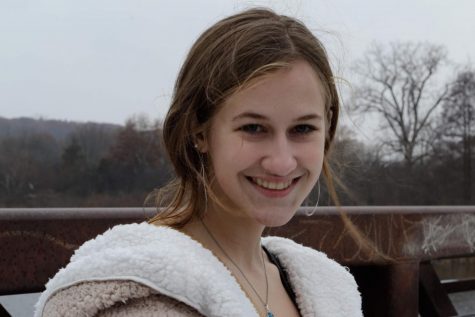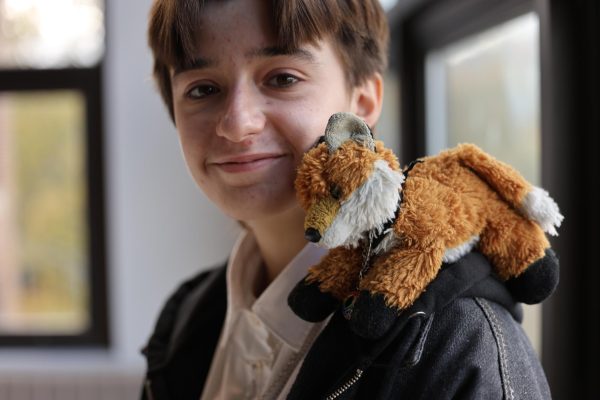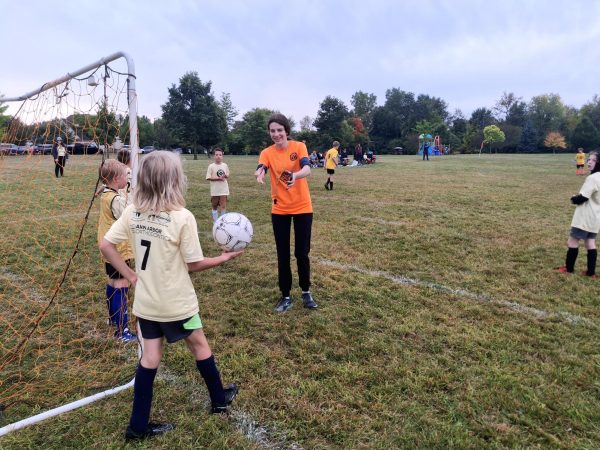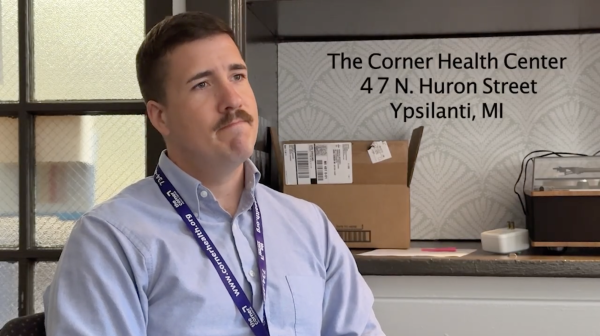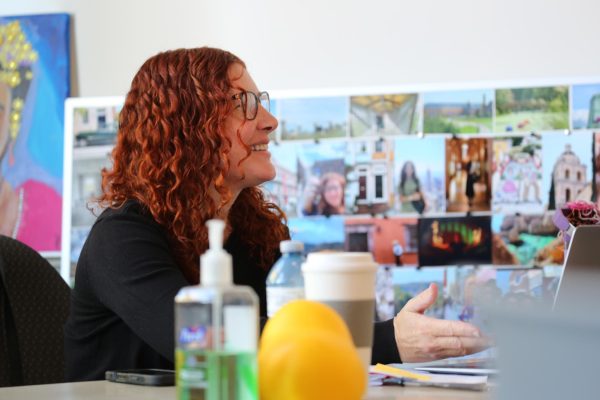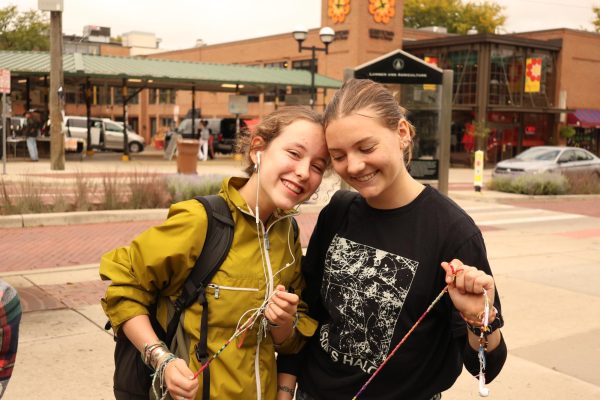Being Bilingual
The perspective of three bilingual Community High students
Meghana
Despite knowing two languages, Meghana Tummala still wants to learn more.
Tummala speaks two languages: Telugu and English. The former is her first language; the later she learned out of necessity.
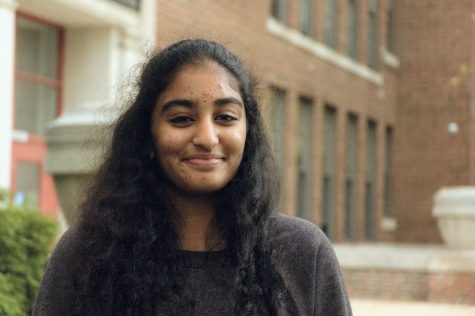
Meghana Tummala has spoken Telugu since birth and learned English later, with her brother. “We watched TV shows together, and that’s how we learned English,” she said.
Tummala was born in Guntur, India, which is now a part of the state Andhra Pradesh. Her parents lived in the United States while her mother was pregnant with her, but returned to India due to complications with their Visa. When she was about one year old, her family returned to America. They lived in an apartment with their extended family in Belleville, Michigan.
Her brother was born soon after they returned. His name is Adarsh, and he is one year younger than she is. He is currently a freshman at Skyline High school. Tummala recounted how they learned English by watching TV shows together when they were young. As she explained it, “I think I just caught on to English; it started to become a part of my life through school and I needed to speak English, to communicate.”
Growing up, their parents did not want their children to lose their first language. “My mom made a rule that was very clear in terms of we had to speak in Telugu at home, or when we were with our parents,” Tummala explained. Because of this rule, Tummala never lost the language.
Telugu is a Dravidian language native to India. There are 75 million speakers of the language worldwide. Tummala uses it when she goes back to India to visit her family; her father’s family lives in Telangana, a neighboring state to Andhra Pradesh.
“Speaking Telugu obviously helps in terms of communicating with my grandparents or relatives,” Tummala said. She went on to explain how she uses it to get by when her family goes to India. “I’m glad I know it.”
When she travels to India, the differences in culture are apparent. “One thing I’ve noticed is in India it’s very open,” Tummala said. “My grandparents all live in one apartment in an apartment building, and everyone knows everyone in that apartment building.”
In her experience, it is very common to walk into someone’s house and get a glass of water to drink. On the ground floor of the apartment building, children play and run around, and it is a common occurrence for them to run to the nearest house to get water and sit.
“It’s very open, whereas here I feel like you can’t walk into a neighbor’s house,” Tummala said. “I feel like most people don’t even know their neighbors. We didn’t even introduce ourselves to our new neighbors until a year later.”
Tummala is passionate about languages. She is currently in Spanish Three, wants to learn Hindi and perhaps an eastern-Asian language such as Japanese or Korean. “It’s not only good to communicate,” Tummala said. “I feel like it’s also good for you personally; you might be more understanding or more understanding of the situation than another person is.”
Anna
Anna Dinov speaks Bulgarian and English. She was born in Los Angeles, but Bulgarian was her first language. Both of her parents are from Bulgaria, and they moved to the United States for graduate school.
Dinov learned English when she was three years old when she attended daycare. Her parents had to give the teachers a list of words in Bulgarian and what they meant so they would understand what she was saying.
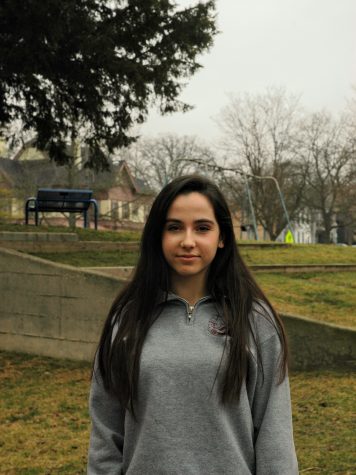
Anna Dinov speaks Bulgarian as well as English. The language that she thinks in is situational, but she dreams in English. This wasn’t always the case: when she was younger, she dreamed in Bulgarian.
Now, she speaks English fluently, and it is her dominant language. She and her family speak Bulgarian mainly at home, but use it elsewhere as well. “A lot of times when we are on vacation and we don’t want people hearing us, it’s a good way to just say stuff without having people know what you’re saying,” Dinov said.
Dinov does not use each language equally, she explained. “I used to be a lot better at speaking Bulgarian and I’m trying to get it back.”
Every other summer, usually, she goes to Bulgaria. Her mother’s side of the family lives there, and she and her family travels to Sofia, the capital of Bulgaria. The differences in culture there are evident to her: the people are blunter, and more open. “It’s just kind of normal like they just kind of make fun of you more, like everyone is a lot more open with everything,” Dinov said.
Dinov doesn’t mind it, but it can be intimidating. She explained how sometimes it is necessary to remind herself where she is. “They’ll say stuff to me that I would find offensive, and sometimes I get offended, but then I realize that it’s in Bulgaria,” she said.
Dinov has found that her usage of each language, whether in speaking or thinking, is situational. When in Bulgaria, she uses Bulgarian, but when surrounded by English she thinks and speaks that.
It can be hard for her to remember Bulgarian while surrounded by English culture and language. “Sometimes people will ask me to say stuff and I just can’t,” Dinov said. “I just forget it.”
Being bilingual affects her life in positive ways. She is taking French, and Bulgarian helps her apply grammar rules because they share some of the same principles.
Dinov is glad she is bilingual. “I like it’s just like something that’s different from others, like not everyone is bilingual and it’s a cool thing.”
She explained how she used to be embarrassed of speaking of Bulgarian when she was young, but how that has passed. “I used to sometimes be embarrassed, but definitely not anymore,” Dinov said. “I’m so proud of being bilingual, I love it.”
Ava
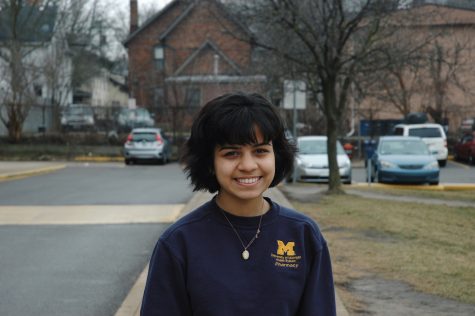
Ava Esmael captured outside of Community High. Esmael has spoken Farsi since birth. “It’s always been a part of my life,” she said.
Ava Esmael thinks in English but dreams in Farsi. She is fluent in both.
Her parents moved to Ann Arbor to attend the University of Michigan. They came from Iran, and her family speaks Farsi. Some part of her extended family speaks Turkish as well, because her grandmother Turkish as well as Iranian.
Her mother says her first language was Farsi, because it was the language that she spoke to Esmael in when she was a baby. Esmael knew English young as well.
Esmael generally speaks Farsi at home, English at school and elsewhere. She also uses Farsi to communicate with relatives. Her family lives around the globe: she has an aunt in Norway; cousins in Oregon and California; an uncle in England; a grandmother who speaks Turkish and Farsi and is living with her family right now; and more cousins close to her in Michigan.
The two languages can be good for different things. “There are certain things that I can only explain in Farsi,” Esmael said. “Just the way it’s worded sometimes, and because you can only describe it in that way.”
“I just like it because even though not that many people speak Farsi, it gives me an opportunity to talk to twice as many more people,” she explained. She is currently taking Spanish as well, because she believes it is beneficial to learn as many languages as possible in order to communicate with a maximum amount of people.
Esmael would like to learn Turkish, because members of her family are Turkish. Another reason to learn it: “When my grandma wants to talk sh*t about us to my mom she talks in Turkish,” she said. She is also interested in possibly learning French.
Farsi is spoken primarily in Iran, Afghanistan and Tajikistan, and there are 110 million speakers worldwide. It is not similar to Arabic-they are in different language families-but can sound similar to the untrained ear. Esmael mentioned the December 2016 incident where two men were removed from a Delta Air Lines plane for speaking Arabic. “Sometimes we get looks because Farsi is kind of like Arabic,” she said.
Despite this, speaking Farsi is an element of her life that she appreciates. “I’m really happy that my parents taught it to me, like the first language, because I don’t feel like I’m disconnected to my culture even though I don’t live in Iran,” Esmael said. She has traveled to Iran before, when she was a baby, but does not really remember it due to the young age. “It just makes me proud to have that a part of me.”
